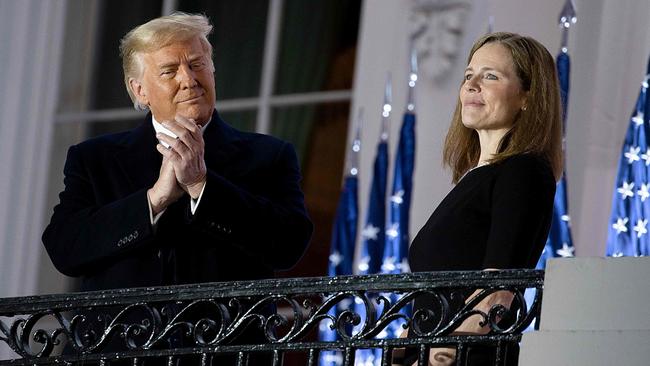
Last year, when Donald Trump nominated Amy Coney Barrett, a deeply conservative jurist, devout Catholic and mother of seven, to take the seat on the US Supreme Court held for almost three decades by the progressive feminist icon Ruth Bader Ginsburg, the response from liberals in the media and the political establishment was a primal scream of fear and loathing.
Barrett was Trump’s third Supreme Court pick in less than four years. This most despised of presidents had been given a rare opportunity to rebuild the legal foundations on which so much of modern America’s social and economic rights and relations rest.
Thanks to their own aggressive judicial activism over the last half century, progressives had made the court the primary dynamo of social change, from the legalisation of abortion and gay marriage to the liberalisation of immigration and toughened environmental regulation: all while dramatically increasing the power of the federal government over the rights of the states. But Barrett would now be part of a solid, 6-3 majority of Republican-appointed conservative justices.
As progressives feared, conservatives hoped this new majority would roll back the progressive advances of recent years. It would surely seize the early opportunity of a pending case to throw out Obamacare, the Democrats’ signature national health insurance system. It would assert the rights of evangelical Christian and right-wing dissenters against laws that protect the rights of minorities, especially LGBTQ members. It would undo Roe v Wade, the landmark 1973 ruling that found in the constitution the right to an abortion. With Barrett’s nomination and Senate confirmation hurriedly arranged right before last autumn’s presidential election, it was widely asserted that the court would find a way to keep Trump in office should he contest the results of the impending vote.
Apocalypse that didn’t happen
“The American people see this confirmation for what it is: an illegitimate move that will set our country back for generations,” Kamala Harris, then a senator, said of Barrett’s appointment. In the fever swamps of the progressive imagination, the new justice was the standard bearer of a terrifying medievalist theocratic authority — The Handmaid’s Tale come to life.
Last week Barrett’s first term on the court — the first term of the 6-3 majority — came to a slightly less apocalyptic end. Inexplicably, life in America seems to be continuing much as before. Women have not been ordered back to the kitchen. Gays and lesbians remain at large, free to continue to enjoy the same rights as everyone else; nobody has had their government-subsidised healthcare taken away.
It’s early days but the new American theocracy we were promised has failed to materialise. The early evidence in fact is that, while this new court majority is indeed solidly conservative, its leading members, Barrett included, but also especially Brett Kavanaugh, another controversial Trump appointee, are exercising a high degree of caution and seeking as far as possible to be inclusive, while holding to their conservative principles.
An unusually large number of important decisions in this first term were decided by unanimous votes — that is, votes that embraced the three progressive justices along with the conservative six.
According to the authoritative SCOTUSblog, a website that analyses cases, hearings and decisions of the Supreme Court of the United States, 43 per cent of cases in this latest term were decided unanimously. That is up from the average of the last three years. Only about one third of cases were decided by 5-4 or 6-3 (mostly conservative) majorities.
There are big decisions to come, not least on an abortion case next year that may be a test of Roe v Wade. But on key cases decided in recent weeks, Barrett and other conservatives surprised critics and supporters alike.
Despite the Democrats’ insistent shroud-waving over healthcare, Barrett joined the three progressives and three of her fellow conservatives to reject an attempt to have Obamacare overturned. In a key religious liberties case, Barrett and Kavanaugh declined to join the more conservative members of the court in seeking to overturn a court precedent that laws that had the incidental effect of infringing religious liberties were not necessarily unconstitutional.
Rebuke
That last case earned Barrett a rebuke from her conservative colleagues who in an angry dissent said she and Kavanaugh lacked the “fortitude” to take a bold decision to assert religious rights.
And as for the court’s new conservatives supposedly finding a way to keep the president who’d appointed them in office after his election defeat, they had already declined after the vote even to hear his appeals, a decision that earned them Trump’s opprobrium.
There was clear evidence of a rightward tilt to the court in a couple of key cases: in one it struck down a California law requiring disclosure of the identity of donors to charities and philanthropic organisations; in another it upheld a state’s right essentially to enforce its own rules on how to run elections.
But what seems to be emerging is a powerful centre-right group acting as the fulcrum of the court, centred around John Roberts, the chief justice, Barrett and Kavanaugh. Roberts himself has been criticised by conservatives for seeming to want to maintain the court’s higher legitimacy with the American people.
It’s possible that, rather than becoming an engine principally for the promotion of conservative ideas, the Supreme Court of Roberts, Kavanaugh and the Handmaid herself may be trying to be the last institution in the country striving to keep a fractured nation together.
The Times







